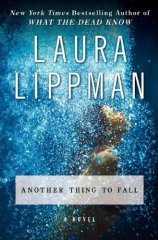



January 2026
What happens when microfilm starts to fade?
That worrisome question occurred to me when I went to the Enoch Pratt Central Library this month to find a Baltimore Sun article not available online, not even for a fee. I found it easily enough, but to my dismay, part of the page had faded. Barely legible on the screen, it was impossible to read once printed out. I sat and filled in the missing words with a pen, but a few were indecipherable, lost to time.
I'm not sure if the Sun has any hard copy now; my own clippings were returned to me while still a staffer there, as the paper began to scan the paper clips into a new software program. That system was just coming on line during my final months, and I remember it as problematic and quirky. I do know the Sun has fewer librarians to help the staff, but the library was always off-limits to civilians, so even if the hard copy still exists, I can't get to it.
Anyway, I paid 42 cents and gave about 20 minutes of my time (including my attempt to fill in missing words on my print-out) to bring this to those who visit this site.
A few points.Janus, the two-faced god who looks back and ahead, is the journalist's guide this time of year. Today, back at 1984. Saturday, ahead at 1985.
"Ronald Reagan's landslide victory, while no surprise, was the top story in 1984 in a poll of Associated Press member editors and broadcasters," AP's John (last name illegible) wrote last week. That the story was "no surprise" means the editors and broadcasters flew in the face of ink-stained tradition in naming it the No. 1 story. [illegible] The surprising, the [illegible, could be "unexpected] that's news. "When a dog bites a man, that is not news, because it happens so often," said John Bogart, city editor of the New York Sun in the 1870s and [illegible]. "But if a man bites a dog, that is news."
But for a long time now, editors and broadcasters have chosen as the top stories of a year major political and military events, natural and man-made cataclysms, [illegible] and technological breakthroughs -- things that often are normal and predictable.
I've been mulling over the AP Top Ten list. Was Reagan's win a bigger story to me than Bhopal? (No. 2) Bigger than Geraldine Ferraro's unprecedented candidacy? (No. 3) Would I rate as No. 1 the assassination of Indira Gandhi? (4) The embassy annex bombing in Beirut (5)? The African famine? (6) The summer Olympics, heart transplants, the U.S. economy, the San Ysidro McDonald's mass murders? (7, 8, 9, 10)?
My No. 1? None of the above. My father died December 5.
The real news of a year is what happens to us and our families. One death in the family can have greater impact on an individual than 20 or 2,000 or scores of thousands of deaths far away.
A wedding or a birth affects one's life more than any Page One headline event. A new job. A promotion. A move to another city. A new home.
Or a plant closes and a career vanishes, a marriage fails, a crippling disease strikes. A friendship ends. A home burns or is flooded out or razed by a tornado. That's the news to those involved.
Christmas is the time of year when many of us get (and deride) those "the year to date" Xeroxed family histories. Mary's engaged, Fred's vice president of the Kiwanis club, the twins got their braces off . . . These are easy targets of derision, because it's clearly not important news to the recipient. But it is to the sender.
Harry Golden, I think it was, once said you find the real news in the little stories on the back of the clippings of the stories about wars, elections, catastrophes. That's true, and in many, many cases the real news never gets in the paper at all.
It is, of course, a newspaper's important job to chronicle elections, wars, sensational crimes and punishment, social, economic and intellectual developments and men biting dogs -- and we will continue to. But we know as you know that that's not always the news.
© Baltimore Sun
- That column is 500 words, in its entirety. Most newspaper columnists are given much more real estate to say what they have to say -- or were, in 1985. It's hard to do something like this in 500 words. In journalism school, they taught us this maxim: "I am writing this long because I don't have time to make it short."
- Isn't it weird how timeless some of the stories are? This past year also had an assassination, of a woman no less, and a major story about the U.S. economy. Not to mention a mass murder in a public space, problems in Africa and way too many bombings to track. The most dated reference in the whole piece may be to Xeroxing.
- Oh, it was written by my father, Theo Lippman Jr., so this is about the death of my grandfather, Theodore Lippman. Lately, through no fault of mine, there's been a bit of a debate about the history of the Baltimore Sun, in which two editors keep insisting it was moribund in the 1980s. Obviously, I'm not objective, but my father won the ASNE award in 1982 and he was surrounded by talented, smart, hard-working people. So I cringe a little bit, whenever I see those criticisms tossed around, with no thought to the people behind the institution.
- I'd dedicate this month's letter to my brother-in-law, Donald Evans, but that's wholly inadequate to the life of a wonderful man. But his death this month underscores everything my father wrote twenty-three years ago.
All About Me
It was fun to return to the microfilm room at the Enoch Pratt because there's where WHAT THE DEAD KNOW began to take shape in December 2026, as I read microfilm and Seventeen magazines and other periodicals from the mid-70s. And WHAT THE DEAD KNOW had a pretty spiffy year, appearing on best/favorite lists in the following publications and websites: New York Times, Washington Post, People, Village Voice, Amazon, Publishers Weekly, the AV Club, the Sun-Sentinel, Seattle Times, the City Paper. No links, because who needs to read all that other than my relatives?
But that's yesterday's news, which is tomorrow's fish and chip paper. This year brings ANOTHER THING TO FALL, the 10th Tess Monaghan novel. Publication date is March 11 and I'll post tour details here in February, but the list of places to be visited includes: Baltimore, Philadelphia, New York, Fort Worth, San Diego, Portland, Seattle,Phoenix, Nashville, Minneapolis-St. Paul, Iowa City, Des Moines, Omaha, Lincoln (NE) and -- maintaining a tradition that dates back to 1997 -- Oakmont, Pa.
Oh, want to win a galley of ANOTHER THING TO FALL? Be the first to find the allusion in this month's essay to one of my favorite singer-songwriters.

